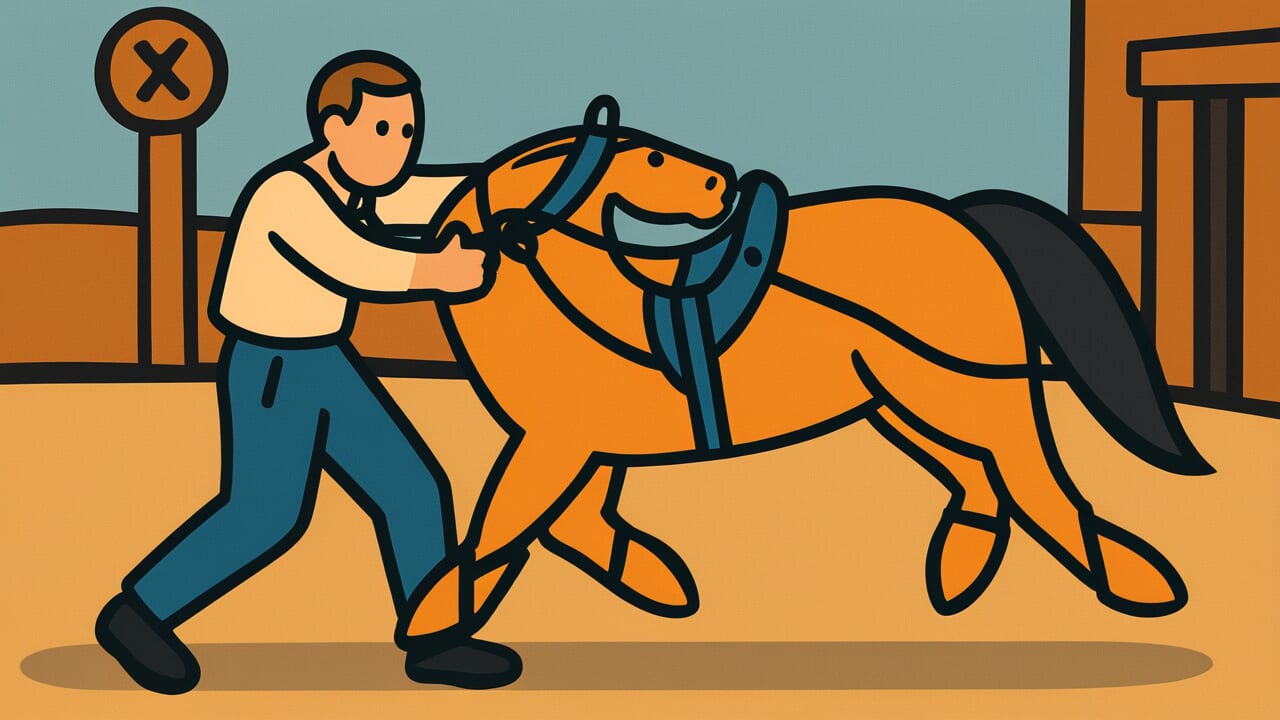How to Read “Whipping a tethered horse”
Tsunagi uma ni muchi wo utsu
Meaning of “Whipping a tethered horse”
“Whipping a tethered horse” is a proverb that illustrates the pointlessness of attacking someone who is already in a secure state.
A tethered horse cannot escape anymore. It is completely under control. Whipping such a horse serves no purpose.
This proverb is used to warn against continuing to blame someone who has already reflected enough on their actions.
It also applies to attacking someone whose position has already weakened. When the other person can no longer resist, continuing the attack is not only ineffective but also cruel.
In modern society, this expression remains meaningful in situations where someone keeps scolding a person who has already failed.
It also applies when someone continues to corner another person who has already apologized.
If the other person has already understood and reflected sufficiently, further blame is not constructive.
This proverb teaches us the importance of moderation and compassion in human relationships.
Origin and Etymology
No clear written records remain about the origin of this proverb. However, we can make interesting observations from the components of the phrase.
“Tsunagi uma” refers to a horse firmly tied to a post or stake.
In Edo period post towns and samurai residences, tying up horses was a daily sight. A tethered horse can no longer escape.
This state represents a situation where something is already completely under control and secured.
The key point here is the act of “whipping.” The original purpose of whipping a horse is to make it run or change direction.
However, a tethered horse cannot move. In other words, whipping it has no effect whatsoever.
Worse yet, it becomes a meaningless act that only causes the horse to suffer.
This proverb may have been influenced by the samurai spirit and Confucian thought of the Edo period.
Attacking someone who had already surrendered or whose position had weakened was considered contrary to samurai virtue.
As a mark of a victor’s dignity, the value of not blaming the defeated more than necessary may have given birth to this expression.
Usage Examples
- He’s already reflected enough, so stop saying things like whipping a tethered horse
- He’s already been demoted, so blaming him further is like whipping a tethered horse
Universal Wisdom
The proverb “Whipping a tethered horse” reflects two essential aspects of human nature.
One is the tendency to blame others more than necessary when we have the upper hand. The other is the conscience that recognizes the pointlessness and cruelty of such actions.
Why do people continue to blame someone who is already in a secure state? It’s because anger and dissatisfaction continue to exist regardless of the other person’s situation.
Even if the other person has already reflected, if our emotions haven’t settled, we continue the attack. This is like the inertia of human emotions.
However, this proverb has been passed down for so long because our ancestors deeply understood that such actions are fundamentally useless.
Whipping a tethered horse won’t make it run. Similarly, further blaming someone whose position has already weakened won’t improve the situation at all.
This proverb teaches about the dignity of a victor. True strength means maintaining moderation when you have power.
When the other person is in a state where they cannot resist, can you stop your attack? That’s where human maturity shows.
Through this simple metaphor of a horse, our ancestors tried to convey one of the most important pieces of wisdom in human relationships.
When AI Hears This
In systems theory, the effectiveness of problem-solving can differ by more than 100 times depending on “where you apply force.”
Whipping a tethered horse is a typical example of “putting all your effort into a place with zero effect,” the most inefficient intervention possible.
What’s interesting is that the human brain has a tendency to focus on “things that move” and “things that react.”
A horse will react if you whip it. It will show pain and try to move. This visible reaction creates the illusion that “something is working.”
Meanwhile, the rope tying the horse doesn’t move. It doesn’t react either. That’s why it easily escapes human attention.
Organizational psychologist Peter Senge points out that 90 percent of problems lie in “system structure,” and only 10 percent can be solved through “individual effort.”
In other words, as long as there’s a structural constraint of being tethered, the horse’s ability or effort doesn’t matter.
Whether you whip it 10 times or 100 times, the distance moved forward is zero.
What this proverb teaches is the cold fact that if you “try hard in the wrong place,” effort and results become completely disconnected.
What’s really needed is structural intervention—untying the rope. That might be easier than whipping, yet human cognitive patterns make it hard to see.
Lessons for Today
What this proverb teaches modern people is the importance of knowing “when to stop.”
Every day, we face various situations where we need to scold or caution someone.
However, don’t we sometimes continue blaming them just because our emotions haven’t settled, even though they’ve already understood and reflected?
At work or at home, adding more words when the other person already understands enough won’t repair the relationship.
Instead, it will leave deeper wounds. What matters is having the calm eye to assess the other person’s state.
If they’re truly reflecting, have the courage to stop there.
Also, this proverb can be applied to yourself. Aren’t you continuing to blame yourself for a failure that’s already over?
Your past self is like a “tethered horse”—you cannot change it. Continuing to whip that spot won’t move you forward.
What you need is the decision to draw a line at the appropriate time and move on.
This applies both to others and to yourself. This proverb gently teaches us the importance of forgiveness and the courage to start walking forward.



Comments